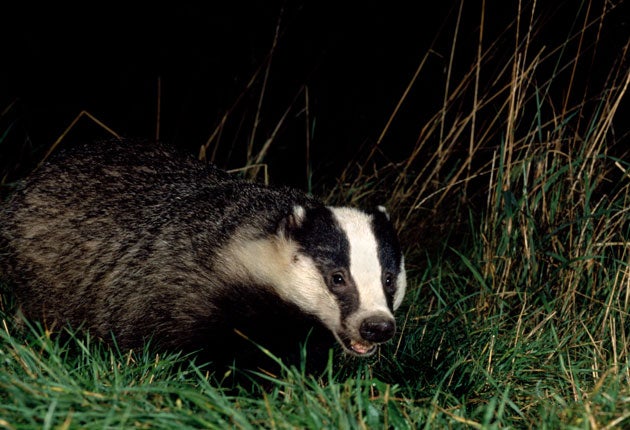Wildlife crime: Britain's killing fields
They call us a nation of animal lovers, yet attacks on creatures in their natural habitats have more than doubled in a year

Crimes against wildlife, including badger baiting with dogs, hare coursing, poisoning of protected birds and even trapping them to sell as caged pets have soared to unprecedented heights. New figures from the police show that the number of wildlife crimes more than doubled in the last year, from 2,177 to 5,854.
Incidents are now being recorded at a rate of 120 a week. They cover not only the slaughtering of badgers and rare birds of prey, but also egg thefts, bird trapping, deer poaching and habitat destruction. Rural areas are where most incidents occur, with Northumbria a conspicuous target for wildlife criminals. More than 500 incidents have been recorded there, with Grampian (244), Humberside (195), and North Wales (188) also wildlife crime hotspots.
What make the statistics even more remarkable is that they do not include crimes against domestic and farm animals. In 2008, the RSPCA investigated 140,000 cases of animal cruelty in England and Wales, a steep rise from the 2003 figure of 105,000. The charity has seen dog fighting rise tenfold since 2004, with nearly 300 incidents last year. Airgun attacks on animals and rustling of sheep and cattle also appear to be on the rise.
One of the sharpest rises has been in what police call "badger persecution", a term that includes badgers being dug out of their setts, pitted against terrier dogs in fights, and being shot by farmers, landowners or their agents. Between February and July this year, the National Wildlife Crime Unit (NWCU) recorded 241 incidents of badger persecution – a total that in just six months almost exceeded the 280 reported incidents in 2008.
Criminals are travelling hundreds of miles to baiting "events", according to Ian Hutchison, a species protection officer for Scottish Badgers. "Badger baiting is taking place throughout the country. It used to be an urban myth that badger baiters would travel all over the countryside. Well, it's not an urban myth any more – they are travelling far and wide to commit offences," he said.
People are betting on the outcomes of fights, he added, and live badgers can fetch a high price. "We have been told that in the Liverpool area, a live badger is worth £1,000 so that it can be fought with a dog."
Mike Butcher, chief inspector of the RSPCA special operations unit, said: "Digging badgers out is very common, and there is a rise in the calls about badgers that we are getting."
Police now plan a major crackdown, Operation Meles, against the resurgence in badger persecution that they say is being driven, in part, by the perceived threat to livestock from bovine tuberculosis. Another police project, Operation Galileo, against hare coursing, was launched by police in Lincolnshire last month. Between September 2008 and March 2009 there were more than 900 reports of hare coursing to the local force.
The rural crimewave is threatening the very survival of some species. Crimes against bats have increased by 10 per cent a year since 2007, and the loss of one roost can be a severe blow to populations that are already vulnerable, according to the Bat Conservation Trust. Last year, the RSPB received 1,206 reports of shooting, poisoning, trapping and disturbance of birds and their eggs – the second highest they have ever recorded.
The theft of wild flowers is also taking its toll on Britain's biodiversity. In May this year, Gloucestershire Wildlife Trust had to issue a warning to visitors to its nature reserve near Sapperton after a spate of bluebell thefts.
Detective Inspector Brian Stuart, head of the NWCU, said: "There is an increase in wildlife crime in general. We are seeking to use wider policing powers, such as the Proceeds of Crime Act, to target criminals where it hurts them most – in their pocket."
Dr Mark Avery, the RSPB's conservation director, said: "There is far too much wildlife crime going on in the countryside. The scale of it is unacceptable in the modern age."
He added: "The hen harrier is pretty close to being extinct in England, in large part down to wildlife crime."
But conservationists, including the RSPB and the Wildlife Trusts, are calling for a radical shake-up of wildlife policing, and claim that an inconsistent response to crime by police means criminals are able to break the law with little fear of being caught. The NWCU has seen its staff slashed from 14 to nine since it was set up three years ago, and there were just 51 convictions in 2008-09 – accounting for just 3 per cent of the cases dealt with.
Huw Irranca-Davies, a Defra minister, said that a government review into the way wildlife crime is being tackled is currently under way and will report in spring 2010.
A breakdown of the latest figures from the NWCU shows that Northumbria is Britain's wildlife crime capital, with 525 incidents, including the highest number of shootings of wildlife, according to the statistics from the latest tactical assessment for the period between February and July 2009. Humberside came top for poaching – with 119 incidents – and the Grampian region had the highest number of reports of wildlife being trapped or snared, as well as being a centre, along with Tayside and Lancashire, for crimes against birds of prey.
North Wales had the most cases of badger persecution and habitat destruction. In terms of bats being killed or their roosts destroyed, Gwent had the highest number of incidents. Hare coursing was greatest in Lincolnshire, and fox-hunting incidents were most commonly reported in Devon and Cornwall. The greatest concentration of birds' nests being destroyed was in Northern Ireland.
Bookmark popover
Removed from bookmarks